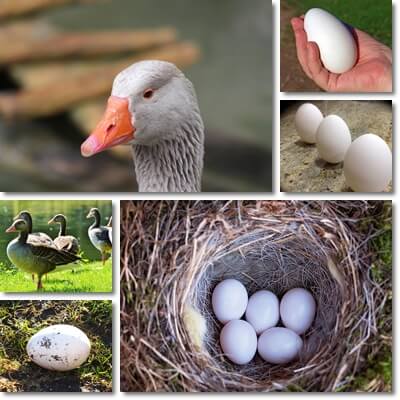Similar to duck eggs, goose eggs are an acquired taste. Their higher yolk to egg white ratio makes them an important source of fat which contributes to a richer taste, but also a higher energetic value. More important, they hold a superior nutritional value, providing high amounts of essential nutrients such as folic acid, vitamin B12, vitamin A, selenium and iron. Goose eggs are rich in protein, each egg providing almost 20 g of quality protein with all 9 essential amino acids. However, because of the high cholesterol and fat content, they are not the best food for diabetics or anyone with high blood cholesterol levels.
What do goose eggs look like?
Goose eggs are large, ovoid-shaped and have a relatively thick, hard, white colored shell. If not washed, the egg shell may appear off-white. One domesticated goose will lay approximately 40 or 50 eggs a year, compared to quails and chicken which lay one, occasionally two eggs a day and ducks which lay one egg every other day. Goose eggs have a bigger yolk-egg white ratio, similar to duck eggs, which contributes to differences in nutritional value compared to other egg varieties as well as a particular taste. But because of the larger size, these differences are more visible.

How big are geese eggs?
Compared to chicken, duck and turkey eggs, goose eggs are huge. On average, one large chicken egg weighs approximately 50 g, one duck egg has 70 g, one turkey egg is 79 g, while one goose egg weighs an average of 144 g. So one goose egg is generally three times the size of a chicken egg and more than two times the size of a duck egg. But goose eggs can easily weigh anywhere from 120 g and 170 g. The younger geese that have just begun laying will generally lay smaller eggs at first. Typically, geese will start laying eggs in April and up until September.
What do goose eggs taste like?
Like duck eggs, goose eggs too have more yolk than egg white compared to most egg varieties. And this higher yolk to egg white ratio gives them a distinct flavor profile. One the one hand, goose eggs are fattier and will taste creamier because of the bigger yolk (and the fact that virtually all the fat in eggs is in the yolk).
Secondly, geese do not have the exact same diet as chickens, but rather more like ducks, to which they are related. And the particularities in their diet contribute to gamy flavors in the eggs, especially in the yolk. At the same time, the taste of goose eggs is similar to that of chicken eggs. For example, an omelet made of goose eggs will taste almost the same as one made with chicken eggs, but a fried, baked or hard boiled goose egg will have a stronger, gamy-like flavor and fattier taste.

Goose eggs nutritional value
As a result of their size, higher yolk to egg white ratio and particular diet of the geese, typical to water fowl, goose eggs have significantly better nutritional value than most other egg varieties. In short, they are higher in cholesterol, Omega-3 fatty acids and fat in general, have more protein and calories than chicken, quail and even duck, and plenty of iron, selenium, phosphorus, vitamins A, B9 and B12. Read below which are the most surprising 9 nutrition facts, properties and health benefits of goose eggs.
Goose eggs benefits for health
High in cholesterol
Goose eggs are extremely high in cholesterol. They have 852 mg of cholesterol per 100 g and 1227 mg of cholesterol per egg (average weight of goose egg: 144 g). The maximum recommended daily intake of cholesterol is 300 mg, so one goose egg provides more than 4 times the RDI of cholesterol for an adult person on a 2000 kcal diet.
What this means is that it isn’t healthy to eat goose eggs every day and, when you do eat them, you can use 1 whole egg and 1 egg white, instead of two whole goose eggs, since the cholesterol and all the other fats are in the yolk. Of course, nobody eats goose eggs every day so indulging in a goose egg every now and then will not have any negative effects on your health.
While cholesterol itself is not bad, too much isn’t good for you either, especially if you have diabetes, cardiovascular problems or are overweight or obese. Diabetics in particular are told to either eat eggs infrequently or not at all because of the nature of their disease.
For a healthy person, cholesterol is actually good in limited amounts because it’s somewhat of an essential nutrient. Some of its most surprising benefits include vitamin D synthesis for a stronger immune system, hormone production for improved fertility and benefits for digestion and brain function (also see the benefits of cholesterol).
Rich in calories
Goose eggs have 185 kcal per 100 g and 266 kcal per egg (average weight of goose egg: 144 g). And most of the calories of goose eggs are in the yolk, where all the fat is too. Surprisingly, most of the calories in goose and all eggs come from the fat in the yolk and not from the protein in the egg white or cholesterol in the yolk. If you eat goose eggs infrequently, their high energetic value will not produce any significant changes in your health status.
High fat content
Goose eggs have 13.27 g of fat per 100 g and 19.11 g of fat per egg (average weight of goose egg: 144 g), which is quite a lot and one of the main reasons why eating them is bad for your health. But in limited amounts, the fat intake from goose eggs brings important health benefits to consumers. For example, fats nourish the brain and support cognitive functions such as learning and memory, combat brain fog and contribute to clearer thinking. A limited intake of fats, preferably healthy fats, promotes fertility in women, lowers the risk of premature birth, aids digestion, helps relieve constipation and contributes to beautiful skin.
Fats profile in goose eggs
Goose eggs contain an estimate of 5.2 g of saturated fat, 8.3 g of monounsaturated fat, 2.4 g of polyunsaturated fat (such as Omega-3 and Omega-6) and, of course, 1227 mg of cholesterol per egg. Values are 40% lower per 100 g.
High protein content
Goose eggs have more protein than chicken, quail, turkey and duck eggs. They provide 13.87 g of protein per 100 g and 19.97 g of protein per egg (144 g). Not to mention the protein in eggs is complete protein, meaning it contains all the essential amino acids the body cannot synthesize itself but needs to keep us healthy. As a result of their high protein content, goose eggs are good for building muscle and provide benefits for brain and nervous system health, combat mood swings and help synthesize neurotransmitters in the brain.
Important source of iron
With 3.64 mg of iron per 100 g and 5.24 mg of iron per egg, goose eggs are an important source of dietary iron. Because they are high in iron, goose eggs are good for managing anemia, helping correct iron deficiency, as well as help restore vitality and boost energy levels, support muscle function and improve physical activity resistance. 100 g of whole egg provides around 20% of the RDI of iron.
Good source of phosphorus
Goose eggs have 208 mg of phosphorus per 100 g and 300 mg of phosphorus per egg, the recommended daily intake being 1250 mg. So 1 whole egg provides approximately 25% of the RDI of phosphorus, contributing to stronger bones and teeth and regulating the processes of bone absorption followed by bone creation.
Excellent folic acid and vitamin B12 content
Rich in both folic acid and vitamin B12, goose eggs help prevent neural tube defects of the brain, spine and spinal cord in newborns, help with normal brain development of babies, help produce red blood cells for elevated energy levels and vitality, prevent mood swings and demyelination of nerve cells (when nerve cells lose their insulating myelin sheath), protecting against diseases such as Alzheimer’s and multiple sclerosis.
- Folic acid: 76 mcg (micrograms) per 100 g and 109 mcg per goose egg
- Vitamin B12: 5.10 mcg per 100 g and 7.34 mcg per goose egg
Rich source of vitamin A and selenium
With 187 mcg of vitamin A per 100 g and 269 mcg per egg, goose eggs provide benefits for eyesight, promoting vision acuity and boost immunity. They are also a good source of dietary selenium (5.31 mcg per egg). Selenium is vital for thyroid health and a sufficient intake from dietary sources prevents hypothyroidism.
Other important vitamins and minerals in goose eggs include:
- vitamin D: 1.7 mcg per 100 g of goose egg (out of 15 mcg recommended daily intake/RDI)
- vitamin B1: 0.147 mg per 100 g of egg (out of 1.2 mg RDI)
- vitamin B2: 0.382 mg per 100 g (out of 1.3 mg RDI)
- vitamin B6: 0.236 mg per 100 g (out of 1.3 mg RDI)
- potassium: 219 mg per 100 g (out of 4700 mg RDI)
- sodium: 138 mg per 100 g (out of 1500 mg RDI)
- zinc: 1.33 mg per 100 g (out of 11 mg RDI)
Goose eggs weigh more than 100 g so the content of essential vitamins and minerals is even higher per egg.
High in Omega-3 fatty acids
As a result of their specific diets, geese produce eggs with good amounts of healthy Omega-3 fatty acids. Omega-3 fatty acids are good for cardiovascular health, raising HDL (good) cholesterol levels as well as nourish the brain, supporting cognitive functions.
How to cook and eat goose eggs?
Like any egg really. Depending on the choice of preparation and the birds’ diet, you may or may not notice a richer taste to them.
For example, scrambled goose eggs may taste exactly like chicken, but hard-boiled or fried goose eggs will definitely have a richer, fattier flavor to them. Just like duck eggs compared to chicken. In any case, it is important to always cook all eggs well to prevent foodborne illnesses.
It is also recommended to wash the eggs if they are extremely dirty, store them in the refrigerator for long-term use and always wash you hands before and after handling fresh eggs, especially if the eggshell is dirty and you are about to handle foods that are meant to be eaten raw, such as salad greens or fruits.
